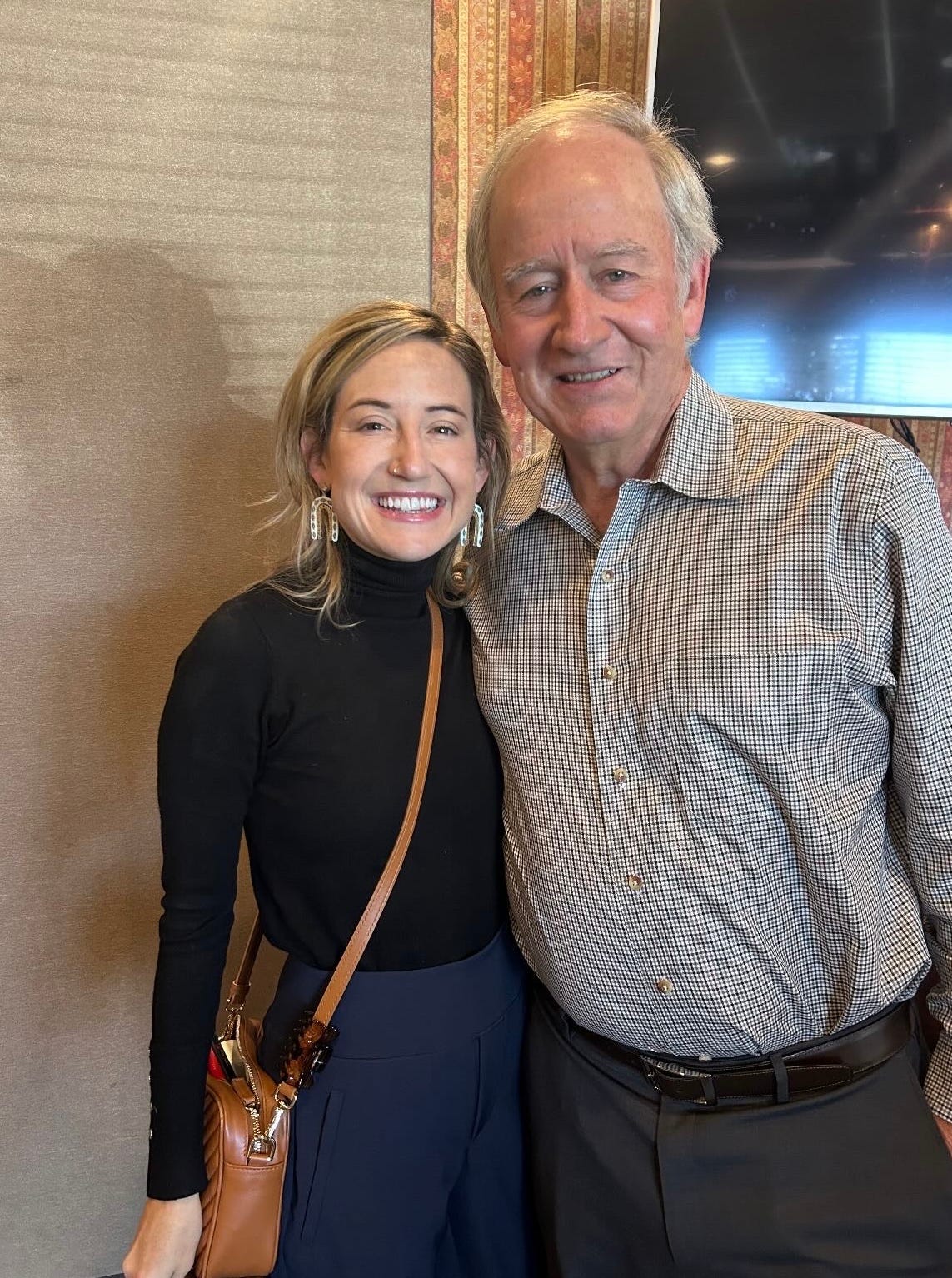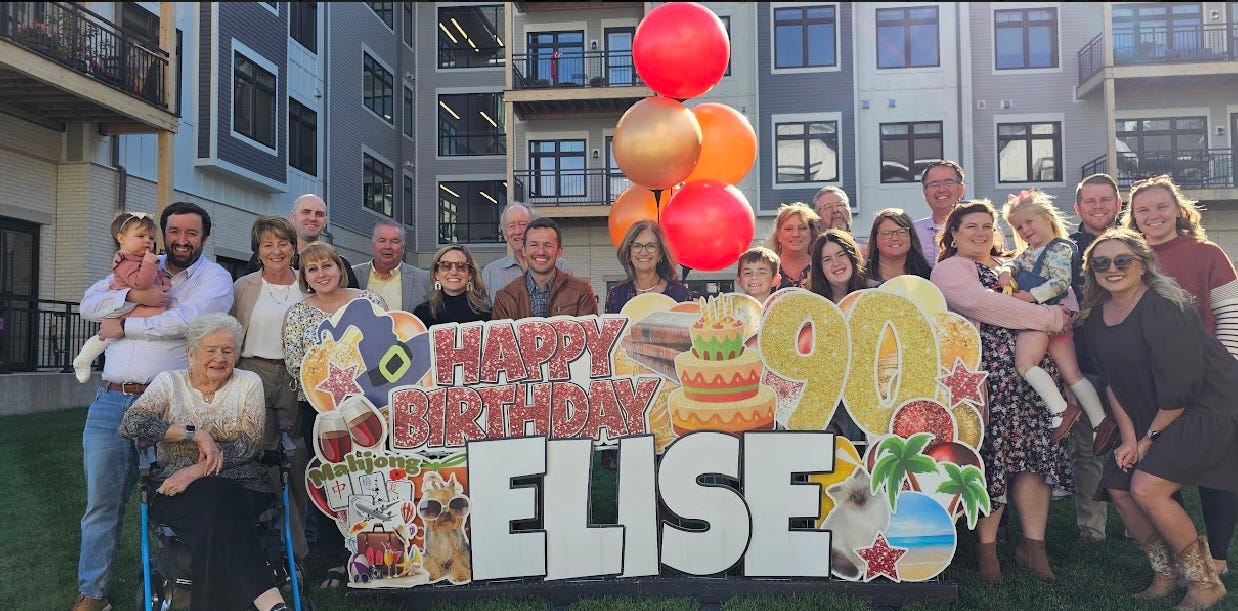11/1 Food for Thought: Eating Disorder News You Should Know About
Week of 11-1-2024 includes a husband blaming his wife for their kid's eating disorder, Twitter (X) exacerbating eating disorder content (of course), and more anorexia and maternal ED research
Happy November from Chicago ya’ll!
I was chatting with a friend and while trying to recount life this past October, I realized I’ve not been in one state longer than six days since August. Between Canada, Michigan, Colorado, Chicago, Austin, Las Vegas, Kansas, Missouri and New York City I’m just whirling through time.
I suppose that’s the forever interesting part of not having a real ‘home’: I end up defining it by where my cat is.
Shockingly, I’ve still somehow been able to write two pieces over the last few weeks, one of which is now my first ‘viral’ Substack article on “When he moves on with someone (much) younger,” which apparently really resonates to a lot of women my age … and also … angry men who seem to really hate women lol.
The other I published earlier this week is on “The embarrassing search for love as a 35-year old nomad” and I’ve really enjoyed reading the perspectives in the comments.
Also, don’t mind me … just out here documenting my love life like chapters in a romance novel until I get to the happy ending lmao.
Anyway, back to regularly scheduled programming this week and I’m stoked to publish a new edition of eating disorder news for the masses, hopefully explained in relatable language and easily summarized to keep you in the know :)
This week, here’s what you should know about eating disorders:
Here’s an unsurprising cultural piece to kick us off:
This NBC article by
on “Posts encouraging eating disorders were recommended to X users”
This article dives into how communities on X are becoming hotspots for pro-eating disorder content, drawing in thousands of teens and young adults, mostly girls (sigh - aren’t you so tired of seeing this type of stuff?), who share tips and encouragement for disordered eating. Despite some moderation efforts by X, these groups keep popping up, and the platform’s algorithm even suggests this harmful content to users who may not actively seek it. As one can imagine, experts say social media alone isn't to blame, but the constant exposure to these messages can worsen eating disorders, especially among young people.
This Guardian advice column by Annalisa Barbieri on “My husband unfairly blames me for our son’s eating disorder”
Usually, this isn’t something I’d post about but I thought it was an interesting perspective. A parent is concerned about their teenage son's anxiety and low self-esteem, which have affected his relationship with food and led to him being dangerously underweight. She and her husband disagree on how to handle it; he is blaming her (because of course) and places the burden and blame squarely on his wife, which is making the situation more unpleasant for everyone. The wife feels that the husband tends to catastrophize and that his need to assign blame allows him to avoid confronting his role in the problem. Experts suggest working together, seeking professional help, and focusing on understanding their son’s underlying anxiety… but what I liked about this article is that I think this can often happen between married couples when they have a child struggling. It’s a keen reminder that one shouldn’t point fingers and try to solely blame another parent for their child’s struggle.
This Women’s Health article by Olivia Luppino on “Is BMI an Accurate Indicator of Health? Experts Weigh In”
I love Olivia and love the subjects she tackles. This article also happened to feature my client, Dr. Erikka D. Taylor, MD, MPH, DFAACAP at Project HEAL! After a barre class, Olivia overheard two people talking about their goal to reduce their BMI, which got her thinking about how Body Mass Index (BMI) can be misleading. If you didn’t know already, I beg thee to take a deep dive. BMI was developed from limited, non-diverse data and doesn’t account for factors like muscle mass or ethnicity, which can lead to inaccurate health labels. Experts consistently say BMI doesn’t always reflect true health, especially for athletes or people of color, and suggest using it as just one of many health markers. A better approach includes looking at overall lifestyle, genetics, and additional health metrics for a more complete picture of well-being. Highly recommend this one.
This Upworthy article by Evan Porter on “Real therapists share 11 'therapy speak' words everyone's using wrong”
Another one featuring one of my client’s, Pathlight Mood & Anxiety and the wonderful Leah Young, LCPC! I love these types of articles because it exhausts me seeing so much therapy speak on IG. Reddit thread recently sparked discussion about how Gen Z often misuses "therapy speak," phrases typically used in mental health contexts. Examples include terms like “gaslighting,” “narcissist,” “trauma,” and “boundaries,” which experts say are frequently misapplied or overly simplified, often diluting their true clinical meaning. While misuse can minimize the seriousness of mental health conditions, therapists see a positive side: increased awareness of mental health. They emphasize the importance of using these terms accurately to gain understanding and compassion.
This research study (now on Nature) on “Visual body size estimation in adolescent anorexia nervosa: Behavioural and neurophysiological data suggest intact visual perception and biased emotional attention” by Hugo Romero Frausto, Isabel Rahder, Anke W. Dalhoff, Kati Roesmann, Georg Romer, Markus Junghöfer & Ida Wessing
This study explored why people with anorexia often overestimate their own body size. Researchers wanted to see if this overestimation was due to problems in visual perception or if it was driven more by emotional factors. They tested 36 teenagers with restrictive-type AN and 42 healthy teens on tasks that involved estimating body size using pictures of bodies of different weights. Brain scans showed that while both groups processed the images similarly at first, the AN patients paid more attention to thinner body images and less to heavier ones. The findings suggest that the overestimation is not because of impaired vision but rather an emotional bias in focusing more on thinness. This points to emotional influences on body perception rather than visual issues in AN.
This research study now on Medscape on “Maternal BMI and Eating Disorders Tied to Mental Health in Kids” by Shrabasti Bhattacharya
This study feels to apt in my life at 35 as it offers insights into the potential long-term impact of maternal health on offspring mental health, emphasizing the importance of considering maternal BMI and eating disorders as factors in neurodevelopmental and psychiatric risk. The findings suggest that children born to mothers with obesity or eating disorders are at an elevated risk for conditions such as intellectual disabilities, sleep disorders, and other neurodevelopmental and psychiatric issues. The research, conducted on nearly 650,000 children in Finland, indicates that these risks may be further compounded by adverse birth outcomes.
Significant results showed that offspring of mothers with eating disorders experienced heightened rates of specific psychiatric disorders, with sleep disorders and social functioning challenges presenting the most considerable risk increases. The study points to the importance of assessing maternal health factors as part of preventive mental health approaches for children. Although limited by factors such as follow-up duration and a lack of paternal and genetic data, this research supports a growing focus on prenatal and preconception health to support offspring mental well-being.
And that’s a wrap for this week folks!
Here’s pictures at the When We Were Young Festival in Las Vegas, living up my emo dreams with The Used, Simple Plan, Cartel, Fall Out Boy, Boys Like Girls, and so many more <3 Ciao everyone.












Great post, Lindsey!
Very informative.
Just want to say that “When he moves on with someone (much) younger" resonates with me simply for the authenticity of expression and the quality of the writing. Keep up the good work 💜
Chicago isn't that far from Ames, IA.....you are welcome at any time. We are grateful for you...you are strong, brave and smart.